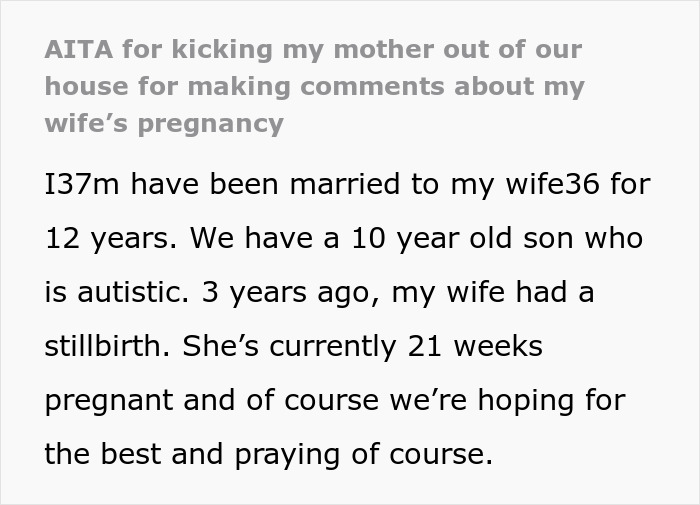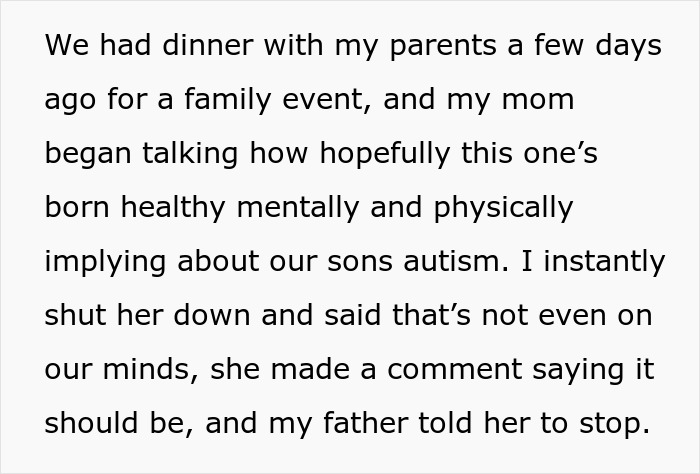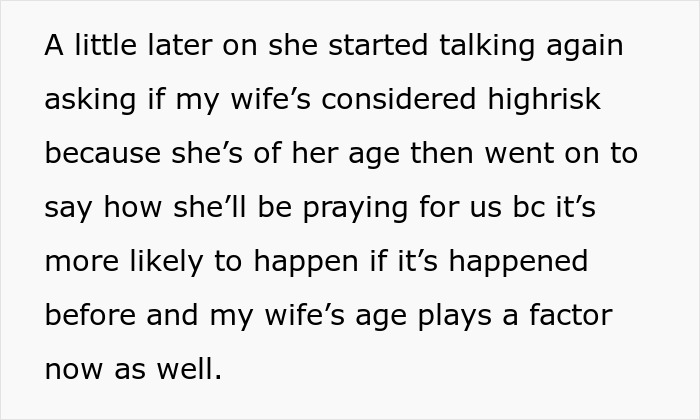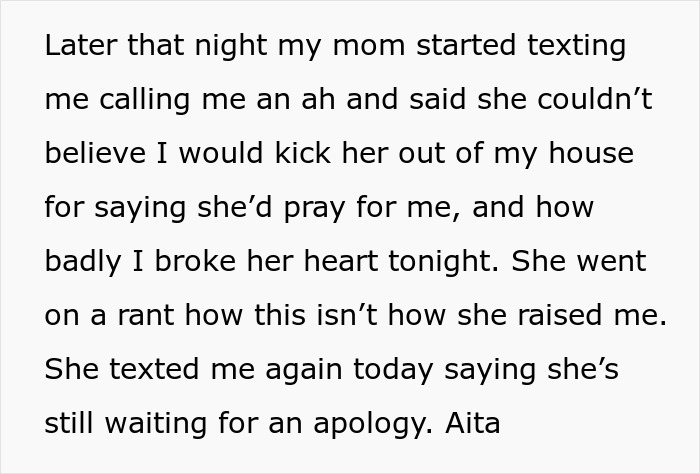Just because you’re someone’s parent doesn’t mean that you can be intentionally rude, blunt, and disrespectful. Epecially toward their spouse and children. And though it’s hard to enforce boundaries with your own family members, sometimes, you have to put your foot down and draw a line in the sand. They have to know that their words have consequences.
Internet user u/Ok_Relation9995, who is the father of an autistic child, asked the AITA online community for its take on a recent spot of major family drama. He revealed that he kicked his own mother out of his home after she wouldn’t stop commenting about his wife’s pregnancy and son’s autism. You’ll find the full story below. Bored Panda has reached out to the author for comment about this sensitive topic, and we’ll update the article as soon as we hear back from him.
It is important to hold your family accountable for their words and behavior, especially when they start making nasty, overly personal comments
Image credits: Kateryna Hliznitsova / unsplash (not the actual photo)
The father of an autistic child asked for help online after kicking out his mother for having a go at both his son and pregnant wife
Image credits: Kateryna Hliznitsova / unsplash (not the actual photo)
Image credits: Ömürden Cengiz / unsplash (not the actual photo)
Image credits: Ok_Relation9995
The signs and symptoms of autism are varied and can differ for kids and adults
Image credits: Lia Bekyan / unsplash (not the actual photo)
Autism, also known as Autism Spectrum Disorder or ASD, is a developmental condition. It affects how a person behaves and communicates.
These symptoms may vary a great deal from case to case. While some individuals experience only mild symptoms and can function perfectly well, others might face lots of challenges in their daily lives.
Some major signs and symptoms of autism in children, as per Verywell Mind, include things such as:
- Struggling to speak, maintain eye contact, control facial expressions, or repeat gestures;
- Sensory issues such as being over- or understimulated by sounds, lights, smells, and pain;
- Not respecting other people’s personal space;
- Not responding to their name when it’s called;
- Having a hard time playing with other kids;
- Trouble understanding other people’s feelings;
- Being distracted in between conversations;
- Finding it tough to understand non-verbal cues;
- Engaging in repetitive behaviors very often, such as lining up items in a particular order or getting upset when they’re out of order;
- Repeating particular words, phrases, and gestures;
- Sticking to strict routines and getting upset if they’re disrupted;
- Obsessing over a new thing or activity they find interesting;
- Experiencing delays in language skill development;
- Being hyperactive, impulsive, and having mood swings;
- Having unusual sleep routines and eating habits.
Raising children with autism may be more challenging, however, it’s important to love them for who they are
Image credits: Jordan Whitt / unsplash (not the actual photo)
Meanwhile, the symptoms of autism in adults are a tad different. And it’s also important to keep in mind that, for example, autistic women may “be quieter and show fewer overt signs of the condition, making it harder to recognize and diagnose.”
Generally, autistic adults tend to stick to strict routines, experience anxiety in social situations, prefer to be isolated, may take things too literally, and have difficulty understanding sarcasm.
Adults with autism also have difficulty expressing themselves emotionally, find it hard to control their tone of voice, can come off as rude when they don’t mean to, and struggle to maintain eye contact.
According to one study, discrimination against autistic people in health, education, employment, and media settings can result in social isolation, exclusion, trauma, masking, and mental health problems.
The NHS suggests that parents raising autistic children use their kid’s name so they know they’re speaking to them. Parents should also keep their language simple, speak slowly and clearly, and use gestures, eye contact, and pictures or symbols to support what they’re saying.
They should also allow more time for their children to understand what you’ve said and consider getting help from a speech and language therapist.
On the flip side, parents shouldn’t ask their children lots of questions, engage in conversation in noisy or crowded places, or use ambiguous phrases or metaphors.
WebMD urges parents to focus on the positive side of things. “Just like anyone else, children with autism spectrum disorder often respond well to positive reinforcement. That means when you praise them for the behaviors they’re doing well, it will make them (and you) feel good. Be specific, so that they know exactly what you liked about their behavior. Find ways to reward them, either with extra playtime or a small prize like a sticker.”
Meamwnile, these parents should love and prize their children for who they are, whether or not they’re ‘on the spectrum.’
It’s also important for parents of kids with autism to remember to take care of themselves, too, because they often face more stress. Focusing on the basics helps, such as getting enough sleep, exercising, eating proper meals, meditating, etc.
How would you react if someone in your family started criticizing your partner and kids, dear Pandas? How do you enforce healthy boundaries with your parents? If you have autism, what would you like everyone to know about your condition? Let us know in the comments below.
Many readers were completely shocked by the man’s mother’s behavior. Here’s the advice they gave him
Thanks! Check out the results:








0 Comments